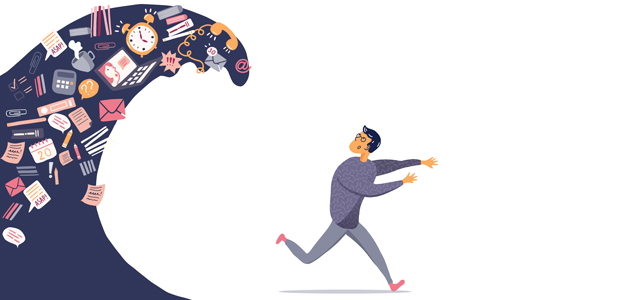
How a CEO Battles Information Overload in 5 Easy Steps
Do you ever wonder how long you spend scrolling on social media platforms? Or, have you ever found yourself deep in a TikTok binge until the early hours of the morning? It’s a remarkably common occurrence, and it’s not your fault: social media apps are intentionally designed with addictive features. This comes at a big cost for both our physical and mental health.
Take 'doomscrolling' as an example; this is the process of trawling through social media feeds and ingesting harmful content. It's no wonder that studies show the links between depression and COVID-19 related media content. Even the glossy photos of Instagram can be to blame for our ever-increasing discontent with how we look and feel. Studies show the platform can induce anxiety by comparing your own life to the picture-perfect “highlight reels" of celebrities who seem to have it all. And that's not even the full picture; consuming vast quantities of information makes us stressed, unproductive, and indecisive. The societal consequences of this are manifold - info overload can make us more depressed and less intellectual.
But it's not all doom and gloom. We have the power to shift our media consumption habits and start to focus on the mindful consumption of information. Being an Ed-Tech entrepreneur, I have witnessed first-hand the importance of managing your information usage for entrepreneurs, founders, and co-workers and my close circle of family and friends. So I've put together five helpful tips I live by to minimise information overload.
1. Do a big digital declutter
Do you really need all of those apps you haven’t opened in a few months? Or all of those documents cluttering up your desktop screen? The answer is probably not. Not only do they slow down your phone, but they clutter up your life and probably make you feel bad for not using them. So if you haven’t opened an app in a few weeks, or get a headache every time you open up your laptop, then a quick swipe-and-click will keep your brain from being bombarded by info overload.
2. Record what you read
Did you know there is a staggering 1.145 trillion MB of data created every day? If you record what you read and keep on top of your consumption habits, you will probably see trends appearing such as your likes and dislikes which can help you select the content that you find helpful and minimise harmful usage. You might also be surprised at the huge quantity of information you can get through each day. This process of recording what you read is no mean feat, but as an experiment, it will surely keep you grounded in your offline and online consumption habits and will also help you learn more and retain more knowledge.
3. Limit your time on social media
There are plenty of apps and methods to limit your use of social media networks that sap your energy. Companies like Offtime or Breakfree aim to help you disconnect digitally and take back your control of information used before you get overwhelmed. And for the old-schoolers, there's always the old-fashioned way - with a timer and some willpower.
4. Hold yourself accountable by sharing your progress
Between family, friends, and work, I know my time is precious. So to ensure I can monitor my consumption habits and spend time on mindful activities, I use Deepstash, the app I co-founded. Deepstash is a knowledge discovery platform where users, known affectionately as stashers, summarise the key ideas from high-quality articles, books, podcasts and videos. I like to share useful info on managing teams better, on parenting tips and the odd article on cryptocurrency. This carefully selective intake of information creates a healthy online and offline mode of information consumption.
5. Have phone-free hours and stick to them
Being productive and effective with your time is equivalent to understanding when you do your best work. This means making sure you don't get distracted during periods of deep work, or as Cal Newport put it 'distraction-free concentration.' Think about setting time limits on how much you use your phone for social media, or creating phone-free hours where you don't touch your phone so you can do your best work. For me, this is the first hour of my working day, and the last 2 hours before going to bed. This keeps me refreshed, grounded, and ready for a good night’s sleep.

